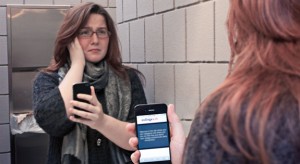The online world is conveniently at our fingertips via Blackberries, iPhones, laptops and other devices, but to some, this constant access and universal fluency in social media can turn into a source of torment.
Last spring, Ithaca College student Mary* logged onto College Anonymous Confession Board and found that she was the subject of malicious, degrading posts on the forum about her body — making fun of her legs, saying she is ugly and publicly commenting on her other features.

“It’s awful because you have no control,” Mary said. “Having this shield of anonymity, it kind of makes you invincible because you can say whatever you want to whoever you want.”
CollegeACB is just one medium, along with texting, Facebook, Twitter and MySpace among others, that has turned into a platform for cyberbullying and online harassment.
Cyberbullying is defined by the Cyberbullying Research Center as “willful and repeated harm inflicted through the use of computers, cell phones and other electronic devices.”
In 2009, MTV and The Associated Press surveyed 1,247 people between the ages of 14 and 24 and found 50 percent said they had experienced cyberbullying. The survey also showed that people between the ages of 18 and 24 were more likely than younger teens to have been targeted.
Senior Rob Engelsman found an “I hate Rob Engelsman” Facebook group his freshman year that had 125 to 175 members in about its first week. The group was made up of people he had graduated with in high school.
“People were posting stories and anecdotes from high school about why they didn’t like me,” Engelsman said. “They were talking about my glib smile and my sense of sarcasm.”
High profile examples of cyberbullying have emerged in all age groups in the past year. Last spring Alexis Pilkington, 17, of West Islip, N.Y., committed suicide because of posts on Formspring.me. More recently on Sept. 22, freshman Tyler Clementi of Rutgers University left the note “jumping off the gw bridge sorry” on Facebook about 10 minutes before killing himself because his roommate tweeted a link to a video stream revealing his sexual encounter with another man.
Support from different voices and communities have been appearing online with some specifically aimed at the LGBT community.
In September, author and editor Dan Savage posted a video titled “It Gets Better” on YouTube as part of the Trevor Project, which is dedicated to ending suicide among LGBT youth. Since the original video, public figures —from President Barack Obama to Ke$ha — have joined in the online effort.
Two weeks later, Ithaca College seniors Matthew Timmons, Engelsman and Nick Righi decided to include the college in the initiative by making their own video, which had more than 16,200 views as of yesterday.
Created Equal, an on-campus LGBT rights group, held a rally against bullying and hate called “Make it Better” on Oct. 28 at the Free Speech Rock outside Campus Center.
Sophomore Devon Ritz, president of the group, said it is important to hold events to show the community that there are people who want to help.
“[It is important] to show solidarity so people know that there are tons of people who care and don’t want this kind of thing to continue,” she said.
Justin Patchin, associate professor of criminal justice at the University of Wisconsin-Eau Claire and co-director of the Cyberbullying Research
Center, said cyberbullying and sites like CollegeACB will go unchecked until society recognizes that online harassment is an issue to be taken seriously.
“We have to develop a culture where people don’t find that kind of harassment and comments humorous,” Patchin said.
October was National Cyber Security Awareness Month, and throughout the month, the college sent out weekly Intercom tips on how to stay safe online.
Information Security Officer Kris Monroe said Information Technology Services does not have a specific way to report cyberbullying at the college, but they do have ways to report computer threats and abuse on their website.
Cyberbullying is still a new subject in the area of legal prosecution and can be difficult for schools to deal with because the bullying is occurring online as opposed to on school grounds.
In September, the University of San Diego’s Center for Education Policy and Law published its findings on dealing with cyberbullying legally.
Frank Kemerer, the principal investigator in the project, found that there have only ever been about 30 cyberbullying legal cases in the U.S.
“[Cyberbullying] is tricky because the first amendment does certainly protect what people do on their own free time,” Kemerer said.
Kemerer said he believes a cyberbullying case going to the U.S. Supreme Court is inevitable.
“When that happens we’ll have a better understanding of the parameters of the law as it relates to student use of communication devices,” he said.
Engelsman said it is not surprising that current college students practice cyberbullying, but it needs to end.
“Our age group really came through the explosion of social networking sites, so we grew up with it,” he said. “But people are scapegoating the sites like Facebook, Twitter and MySpace as the problem instead of looking at the root cause, which is our attitudes. A lot more people are getting away with it and a lot more people are getting hurt by it.”







